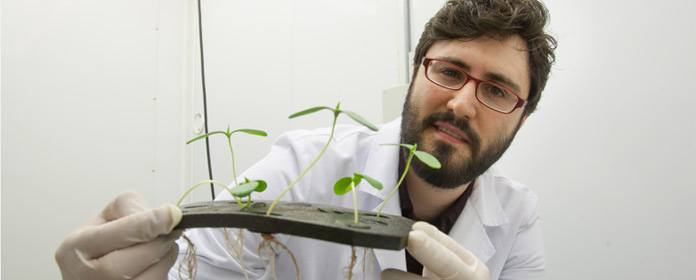"Our goal is to reduce the amount of fertilizer needed to move towards more sustainable agriculture."
David de Hita explains the goal of his doctoral thesis , which he has been able to start thanks to the support of the Chair Timac Agro - University of Navarra.

PHOTO: Manuel Castells
David de Hita is the first scholarship holder by the Chair Timac Agro - University of Navarra to carry out his doctoral thesis , which began in the 2015-16 academic year and focuses on the study of endophytic microorganisms when there is nitrogen limitation in plants. A work oriented to achieve a more efficient and sustainable agriculture that develops within the department of Environmental Biology of the School of Sciences.
- What is the topic of your doctoral thesis and what is the hypothesis of your research?
My thesis focuses on the study of endophytic microorganisms (microorganisms that inhabit the interior of plants without causing damage) and their response to nitrogen limiting conditions for the plant. The hypothesis of work is that some of these microorganisms proliferate when the plant does not have enough nitrogen and, as a consequence, the availability of nitrogen for those plants increases. In addition, at research we will try to enhance this phenomenon by combining it with humic substances (subject decomposed organic substances found in the soil).
- What application internship could have for the improvement of plant cultivation?
If our hypothesis is proven, we could work with specific microorganisms - with those that show the best activity in making available nitrogen - to combine them with traditional fertilizers. This strategy would reduce the units of fertilizer that need to be applied to a crop to obtain the same production, which would favor a more sustainable agriculture.
- Why is it so important to contribute from research to a more sustainable agriculture?
Some of the main problems that the environment suffers today -such as eutrophication of inland waters, contamination of subway aquifers or loss of soil fertility- are mainly caused by the excessive use of fertilizers. For this reason, from Chair and department of Environmental Biology we propose the importance of researching more efficient fertilizers that combine the biological component to improve the nutrients availability .
- In your first year of thesis , what specific objectives have you set yourself?
During this first year, my main objective goal is to fine-tune both the development of the plants under nitrogen limitation conditions and the detection of these microorganisms. Working with endophytic microorganisms is complicated because they hide very well inside the plant. Our approach is to locate them by molecular biology. It is a complicated step, but the University has the experience and the necessary techniques to achieve it.
- How do you value the support of Chair and group Timac-Agro?
For me it is tremendously positive. Nowadays it is not easy to have the confidence of two such relevant institutions. In addition, both Chair and Timac Agro have supported my ideas at all times, and have given me the time and space to develop them. Such an environment and trust is a privilege. Also, personally, it is very stimulating to know that you have such an important support behind you. But at the same time, it also means a greater responsibility.
